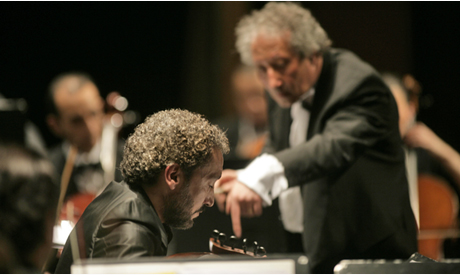
Shamma and El-Saidy, an exceptional duet. (Photo: Sherif Sonbol)
Thinking it over, it’s not as strange as it looks. While rooted in classical Arabic music, Naseer Shamma, the oud virtuoso, composer and founder of Beit Al-Oud Al-Arabi (The Arabian Oud House) is a free spirit, and an innovative, open and forceful artist. “No rules or limitations can stand between music and me, because this is what gives me life: to create something new,” Shamma once said. So, it is no wonder that he is embarking into the world of classical western music with the eight-strings oud he designed himself.
The oud is the ancestor of the mandolin. They belong to the same family of instruments and can replace one another. As was the case on Tuesday evening when Shamma played Vivaldi’s Concerto for Mandolin in C major brilliantly. Vivaldi composed this concerto in 1725 (the same year as the Four Seasons), in Venice, his home town, upon his return from spending three years in Rome.
It is one of the most famous and challenging pieces for the mandolin, yet rarely - if ever - performed in Egypt. The first and the third movements are Allegro, vivid and joyful. The second movement, slower, is a beautiful lyrical Largo.
It was a pleasant change of mood after Respighi’s melancholic Suite no. 3 for Strings, opened the concert. After the intermission, Suite no.1, more cheerful, was performed by the orchestra, the strings joined this time by wind instruments and the harp. Both suites are composed by Ottorino Respighi (1879-1936). The Italian composer, best known for his Roman Trilogy including The Fountains of Rome, was interested in the music of the 16th, 17th and 18th centuries, which led him to composing pieces based on the music of this period. The two Suites were performed by The Philharmonic Chamber Orchestra alone. They are based on lute songs, which explains their inclusion in the concert.
Then, Naseer Shamma mesmerized the audience again, this time playing a transcription for the oud of Paganini’s eternal 24th Caprice for violin. This tune with 11 variations requires extraordinary virtuosity whichever instrument it is played on. The composition has inspired a great number of composers, like Liszt, Brahms, Rachmaninoff and others. The typical sound of the oud and Shamma’s masterful playing gave it a particular charm.
The last piece of the programme, also with the oud, was Rossini’s scintillating The Barber of Seville Overture (1816). Its spirited humour and the vivacity of the typical Rossinian crescendo always stirs the audience's enthusiasm. Beethoven told Rossini when they met in 1822, congratulating him on the opera: “It will be played as long as Italian opera exists.” And he was right; it has remained popular ever since its premiere.
As an encore, Shamma played a piece of his own composition with unusual emotional depth. In a part, he used the one-handed playing technique he invented to enable the handicapped to play the oud.
There’s something more than presence in Shamma’s performance. His music reaches the heart and touches the soul. He has a strong ability to communicate. I recall, during a concert in Beit El-Harrawy, some years ago, an improvised dialogue between Shamma’s oud and Spanish-French guest Dyani Dharma Mas’ guitar. It was amazing!
“I want my music to remain the spirit of humanity through the expansion and extension of the human soul.” - Naseer Shamma
The Philharmonic Chamber Orchestra started its activities in 2003 as an initiative of Maestro Ahmed El Saedi, its main founder and chairman. Since then, it has performed successfully at different venues in Cairo. The orchestra 2010/2011 programme features soloists of a high international calibre and promises a highly enjoyable and unforgettable music experience.
Photos by Sherif Sonbol
Short link: